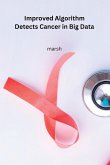Identifying Cancer through Genomic Data Analysis" is a comprehensive guidebook that explores the latest advancements in genomic data analysis for the identification of cancer. The author of this book is Michael, a prominent researcher and scientist in the field of cancer genomics. In this book, Michael provides a detailed and in-depth analysis of how genomic data can be used to detect cancer at an early stage, and how it can also be used to understand the molecular basis of cancer. The book begins with an introduction to the basics of genomic data analysis and its applications in cancer research. The author explains how genomic data can be used to identify the genetic alterations that contribute to the development of cancer. This section is particularly useful for readers who are not familiar with genomic data analysis and provides a solid foundation for the rest of the book. The following chapters delve deeper into specific genomic data analysis techniques and their applications in cancer research. For instance, the author discusses how gene expression profiling can be used to identify different types of cancer, and how mutations in specific genes can be used to predict cancer risk. Michael also explores the role of epigenetic modifications in cancer development, and how these modifications can be used as potential biomarkers for cancer detection. The book also covers the latest advancements in next-generation sequencing (NGS) technologies, which have revolutionized cancer genomics. The author explains how NGS can be used to analyze large-scale genomic data sets and how it can be used to identify new cancer subtypes and potential drug targets. Overall, "Identifying Cancer through Genomic Data Analysis" is an excellent resource for researchers, clinicians, and students interested in cancer genomics and personalized medicine. The book is well-organized, easy to read, and provides a comprehensive overview of the latest advancements in genomic data analysis for cancer research. Michael's expertise in the field of cancer genomics is evident throughout the book, making it a valuable addition to the scientific literature on cancer research.







![One Bite at a Time, Revised: Nourishing Recipes for Cancer Survivors and Their Friends [A Cookbook] One Bite at a Time, Revised: Nourishing Recipes for Cancer Survivors and Their Friends [A Cookbook]](https://bilder.buecher.de/produkte/23/23490/23490116m.jpg)
